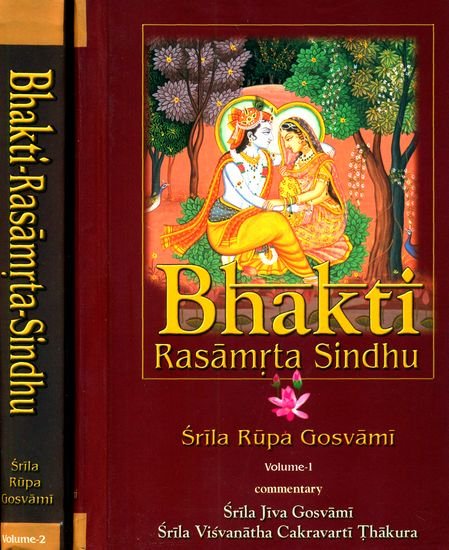Bhakti-rasamrta-sindhu
by Śrīla Rūpa Gosvāmī | 180,912 words
The English translation of the Sri Bhakti-rasamrta-sindhu verse 2.1.171; a medieval era Sanskrit book, written by Rupa Goswami (fl. 15th century) which represents a devotional (bhakti) masterpiece. In this work Goswami describes the nature and different forms of pure love (rasa) as well as various other topics on Vaishnavism and devotion.
Verse 2.1.171
Sanskrit text, Unicode transliteration and English translation:
यथा प्रथमे (१.९.४१) —
मुनि-गण-नृप-वर्य-सङ्कुले’न्तः- सदसि युधिष्ठिर-राजसूय एषाम् ।
अर्हणम् उपपेद ईक्षणीयो मम दृशि-गोचर एष आविर् आत्मा ॥२.१.१७०॥yathā prathame (1.9.41) —
muni-gaṇa-nṛpa-varya-saṅkule’ntaḥ- sadasi yudhiṣṭhira-rājasūya eṣām |
arhaṇam upapeda īkṣaṇīyo mama dṛśi-gocara eṣa āvir ātmā ||2.1.170||
English translation
Sanskrit text, Unicode transliteration and English translation:
अन् एxअम्प्ले fरोम् थे Fइर्स्त् चन्तो ओf श्रीमद्-भागवतम् [१.९.४१]:
“अत् थे राजसूय-यज्ञ [सच्रिfइचे] पेर्fओर्मेद् ब्य् महाराज युधिष्ठिर, थेरे wअस् थे ग्रेअतेस्त् अस्सेम्ब्ल्य् ओf अल्ल् थे एलिते मेन् ओf थे wओर्ल्द्, थे रोयल् अन्द् लेअर्नेद् ओर्देर्स्, अन्द् इन् थत् ग्रेअत् अस्सेम्ब्ल्य् लोर्द् श्री कृष्ण wअस् wओर्स्हिपेद् ब्य् ओने अन्द् अल्ल् अस् थे मोस्त् एxअल्तेद् पेर्सोनलित्य् ओf गोधेअद्. थिस् हप्पेनेद् दुरिन्ग् म्य् प्रेसेन्चे, अन्द् इ रेमेम्बेरेद् थे इन्चिदेन्त् इन् ओर्देर् तो केएप् म्य् मिन्द् उपोन् थे लोर्द्.”
(४८) समृद्धिमान् —
महा-सम्पत्ति-युक्तो यो भवेद् एष समृद्धिमान् ॥२.१.१७१॥An example from the First Canto of Śrīmad-Bhāgavatam [1.9.41]:
“At the Rājasūya-yajña [sacrifice] performed by Mahārāja Yudhiṣṭhira, there was the greatest assembly of all the elite men of the world, the royal and learned orders, and in that great assembly Lord Śrī Kṛṣṇa was worshiped by one and all as the most exalted Personality of Godhead. This happened during my presence, and I remembered the incident in order to keep my mind upon the Lord.”(48) samṛddhimān —
mahā-sampatti-yukto yo bhaved eṣa samṛddhimān ||2.1.171||
English translation
(48) samṛddhimān: prosperous —
“He who possesses great treasure is called prosperous.”
